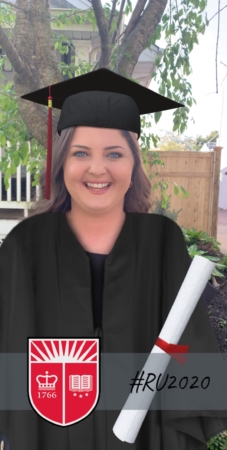Class of 2020: Jessica Easton, MSHM
Anything is Possible for Jessica Easton
 Jessica Easton was determined to graduate from her M.S. in Health Care Management degree program regardless of the obstacles put in her pathway.
Jessica Easton was determined to graduate from her M.S. in Health Care Management degree program regardless of the obstacles put in her pathway.
In December, she was diagnosed with Stage 4 kidney failure and spent 10 days in the hospital receiving treatment, including chemotherapy. During those 10 days, her application to the Institutional Review Board was due for her capstone – the final step separating her from her diploma.
“I was not going to give up,” Jessica said. “It was not an option”.
While in the hospital, she worked tirelessly to submit her application to the IRB, even when her energy was spent. Jessica could have taken a leave, but she wanted to persevere, something she is personally very proud of accomplishing.
“I immediately realized that she was an extremely strong and dedicated student,” said Dr. Tracy Davis, assistant professor and Jessica’s graduate project advisor. “When she informed me that she had been hospitalized and would need to undergo treatment, I fully expected that she would take a leave of absence. To my surprise she informed that she wanted to push forward with her project. And, she did.”
As a first-generation college graduate, she was determined to achieve her goal, not only for herself, but for her family as well.
“As the first in my family to obtain a college degree, let alone a master’s degree, I wanted to prove to all of us that I could accomplish my goal. I wanted to finish. Nothing was going to stop me,” she said.
After three months of treatment and recovery, Jessica returned back to work as the activities director at a New Jersey-based assisted living facility in Monmouth County, just as COVID-19 was starting to hit the tri-state. Even though Jessica would be considered at-risk, she knew that her residents and employees needed guidance during this unprecedented time.
Her capstone project focused on creating robust policies and building strong relationships between assisted living facilities and hospice care companies, while making sure families are included as partners in communication.
Even though her focus was not on pandemic communication, her research proved valuable to navigating the current reality. “She presented an amazing project on a topic that will be
beneficial to her place of employment and many other similar assisted living facilities,” said Dr. Davis.
Faced with a “no visitor” policy at the end of March, which included hospice partners for a brief period, the facility had to fill a large gap in care for the residents. To provide new communication methods, Jessica and her team quickly purchased iPads and Zoom, and established a schedule so everyone still felt connected to their families, even if it was virtual.
“Teamwork and communication are key in care of our elderly population, but especially now,” said Jessica.
After pushing through her diagnosis, completing her education, and managing a pandemic in an at-risk facility, Jessica is excited about her future and feels nothing is impossible.
